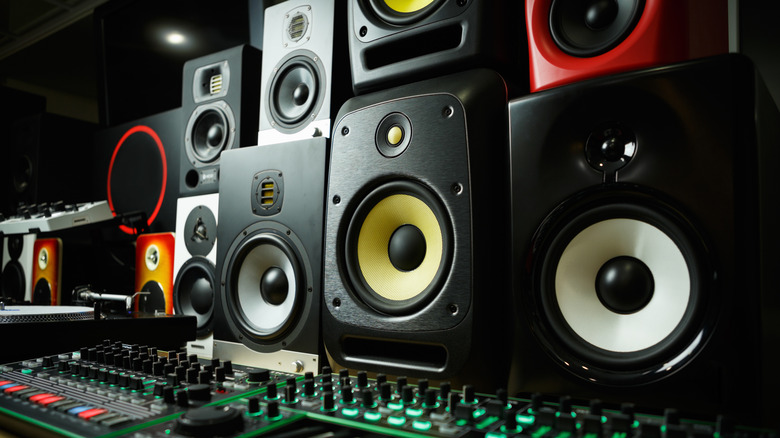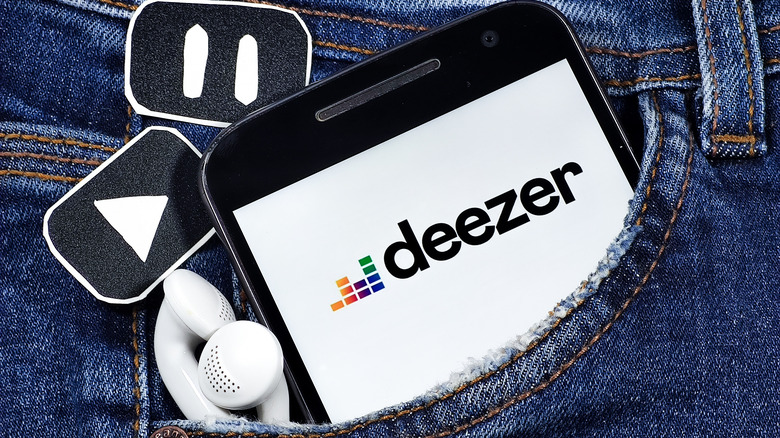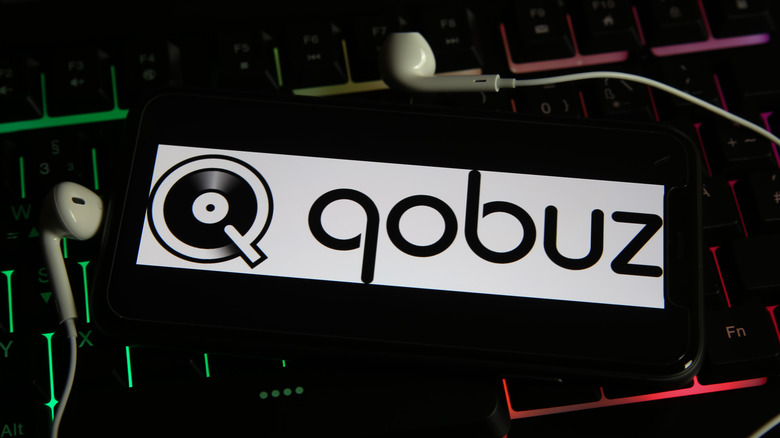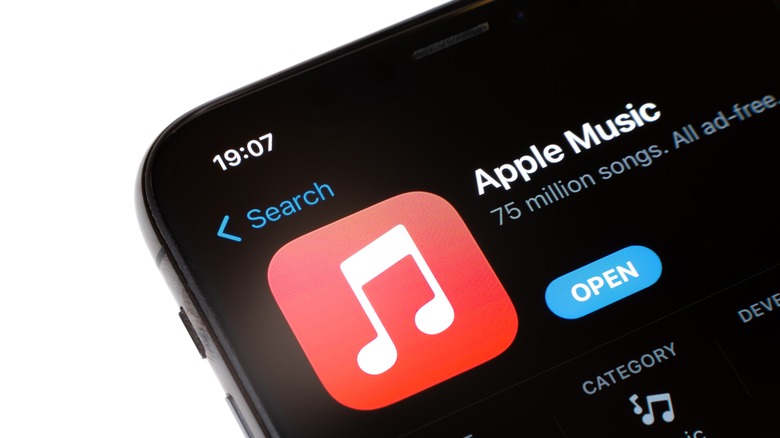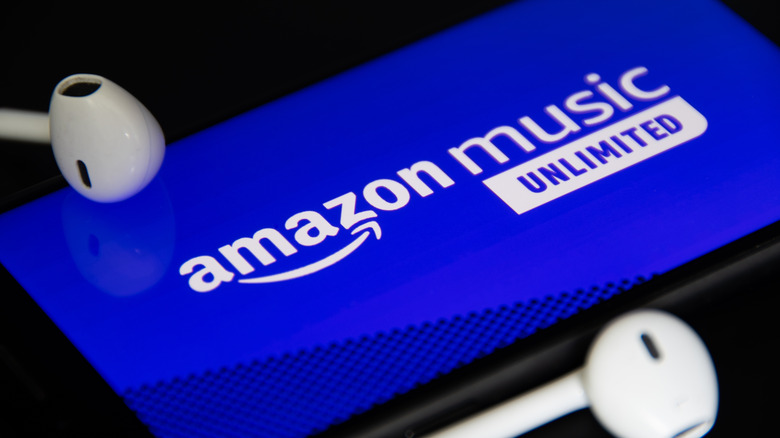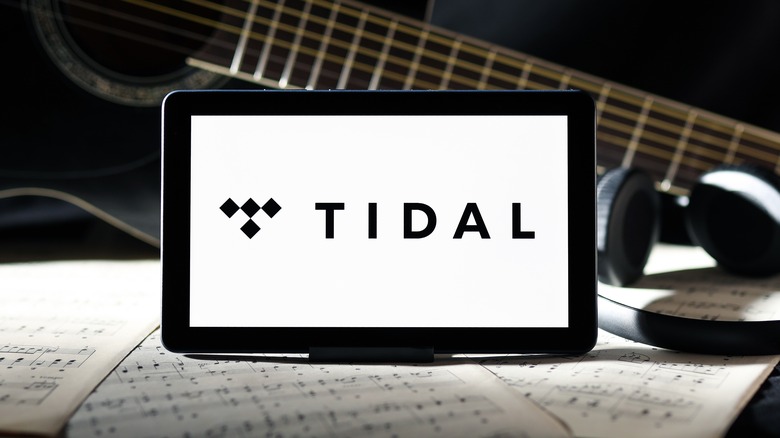The Best Music Streaming Services For Hi-Fi Audio, Ranked
We may receive a commission on purchases made from links.
Most audiophiles will tell you that listening to music on vinyl is a richer experience than listening to music digitally, but it's hard to argue against just how convenient streaming services are when it comes to listening to whatever you want, whenever you want. Fortunately, more and more streaming services are embracing hi-res and hi-fi audio, giving listeners the opportunity to listen to higher-quality music without having to carry a turntable on their backs.
"Hi-fi" is short for "high fidelity" and is used to describe music and music players that can faithfully reproduce what a typical human ear would hear if the music was playing live. Digital music, like CDs and MP3s, can't quite match the highest and lowest frequencies and dynamic range of human hearing. Hi-res audio takes this a step further, and is officially defined by the Consumer Electronics Association as being 96kHz/24-bit, compared to the 44.1kHz/16-bit levels most CDs and streaming source files reach. Usually though, the terms "hi-fi"and "hi-res" are used interchangeably and can be generally defined as "CD quality or higher."
More streaming services are offering higher-quality streaming tracks, giving them monikers like "Ultra HD" or "Master Quality." However, features vary from service to service, including the amount of hi-fi tracks available, the limits to how you can listen to them, the lossless formats used, and the pricing plans for access. To help decide which is right for you, here's a list of the best hi-fi music streaming services today.
5. Deezer
Not to be confused with the band Weezer, Deezer is an innovative online music streaming platform, and was the first to offer 360 Reality Audio, a Dolby Atmos-like enhancement designed specifically for streaming. Of course, it wasn't the last to offer this, and competitors like Tidal and Amazon Music Unlimited now include the same. Unfortunately, those (and other) services also offer true hi-res music, whereas Deezer is the only service on this list that cannot exceed 16-bit audio.
Deezer does have a large catalog of hi-fi music and podcasts however, using FLAC audio codec files to stream CD-quality tracks. Its prices are reasonable as well, with the Premium tier costing $10.99 per month and Family plan costing $17.99 per month. You also have the ability to download some songs and podcasts to listen to offline. However, Deezer's algorithmic personal curation and discovery isn't as strong as its competitors. Combined with the technical limitations of their music quality, Deezer is a good choice but not the best choice for a music streaming service.
4. Qobuz
If you're an audiophile who feels more comfortable owning their music rather than just streaming it, Qobuz is a great option that allows you to buy and download the music in its catalog. Even better, the tracks are high-quality, with much of the music available in hi-res up to 24-Bit/192kHz. The pricier "Studio Sublime" tier gives subscribers a discount on purchases and costs $179 per year, while the standard Studio Premier plan will run you $12.99 per month.
One of the downsides to using the lesser-known Qobuz service is its lack of support for most smart speakers, though it is the first service to bring hi-res audio streaming to the Sonos ecosystem. Other drawbacks include its lack of auto-generated playlists and "radio stations," or other perks like music videos and karaoke mode that you can find elsewhere. The Qobuz library also lacks some popular music you'd expect to find nearly everywhere else, which can prove frustrating if you're in a top 40 mood.
3. Apple Music
Apple Music sits perfectly in the middle of this list because it doesn't have any notably unique features that make it stand out but also doesn't lack spatial audio or lossless tracks available up to 24-bit/192kHz. Considering you're getting hi-res music, its pricing is fair, especially for Apple, with its main tier costing $10.99 per month. There's also a family subscription plan for $16.99 per month that allows six people to use it through iCloud Family Sharing, and a discounted college student tier for $5.99 per month that includes Apple TV+ for free.
For users already immersed in Apple's ecosystem, Apple Music is a great choice because of how well it integrates with your devices. It also has a clean, attractive interface, as well as a large music catalog and above-average algorithms that provide some of the best curated personal playlists available. However, this may not be enough for Android users to get on board. One major drawback is the need for an external DAC to hear lossless streaming at top quality — even Apple's own headphones won't be sophisticated enough to play hi-res tracks at full range.
2. Amazon Music Unlimited
If you're an Amazon Prime member, you may be using its Amazon Music streaming service, which comes at no extra cost and is the default music player for Alexa-enabled devices. But by paying a little extra each month, you can subscribe to Amazon Music Unlimited, which among other perks, offers "HD" and "Ultra HD" music content, which is the service's way of branding hi-fi audio. The Ultra HD tracks can be streamed at 24-bit/192kHz, and Amazon seems intent on using high-quality audio to better help it stand out from the competition. It's been steadily increasing its Ultra HD library since its 2019 launch, and the library currently includes millions of hi-fi tracks in addition to its catalog of over 100 million tracks offered in CD-quality.
Amazon Music Unlimited is also offering more innovative music formats, like spatial audio, even allowing listeners to enjoy this enhanced music with its existing headphones, unlike other services that require specialized equipment to do so. Its library of spatial audio tracks, as well as Dolby Atmos and Sony's 360 Reality Audio files, is also constantly growing. The Unlimited tier costs $10.99 per month, though a $5.99 per month student tier is available. However, Amazon's algorithms leave much to be desired when compared to a lot of their competition, so don't expect its personally-customized playlists or new music suggestions to be incredibly useful.
1. Tidal
Tidal made a name for itself early on by prioritizing artists and giving them higher royalties. To help pay these royalties, the streaming service costs more than most, but in return subscribers get a premium music streaming experience, including a fantastic interface and exclusive content like concerts, live streams, and backstage footage. Additionally, Tidal boasts very impressive sound quality. Its Hifi Plus tier offers over 170,000 MQA-encoded "Tidal Masters" tracks, which are hi-res files that can range from 24-bit/96kHz to 24-bit/192kHz. There's also songs mixed in Dolby Atmos Music, Sony 360 Audio, and other immersive sound formats.
Being the best comes with a price, though. Tidal is one of the pricier streaming services available, and its hi-res HiFi Plus tier will cost you $19.99 per month. If you want to spend less, you can subscribe to the $9.99 per month HiFi plan. Tidal even offers a completely free tier that includes lower-quality audio and advertisements.
